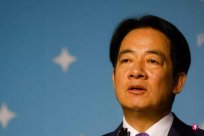Source: Bloomberg
After being ordered by the Hong Kong court, China Evergrande Group, which is at the Center of China Real Estate Crisis, is moving towards liquidation.
This is another bad milestone founded by Xu Jiayin's establishment of the real estate giant after more than two years of default, which also marked a new chapter in the Chinese real estate crisis that has been dragging on economic growth for a long time.
1. How did Evergrande take this step?
Evergrande, founded by Xu Jiayin in 1996, relied on a large amount of debt to achieve growth.It has the largest US dollar debt in housing companies, once the highest sales developer in China.However, after the Chinese government began to curb the excessive debt of the real estate industry, the company encountered difficulties in debt -re -financing in 2020.In December 2021, Evergrande broke the bond defaults and was in a long -lasting negotiations with the creditor's final reorganization plan.
Investors from Evergrande's subsidiaries filed a lawsuit in June 2022, seeking liquidation to Evergrande.Chen Jingfen, a judge who tried the case, repeatedly hearing, so that Evergrande had time to finalize the reorganization agreement.However, in September last year, after Xu Jiayin was controlled by the police for suspected illegal crimes, Evergrande's debt restructuring plan was in a deadlock.
On January 29, Chen Jingfen was patient and issued a liquidation order in the Hong Kong High Court.
2. What will happen next?
The Hong Kong Court has appointed Alvarez Marsal as an Evergrande Clear.
The longer -term challenge lies in how to divide the developer. Its 2.39 trillion yuan liabilities exceeded 1.74 trillion yuan of assets, of which most of the assets are in Mainland China.
3. What does liquidation make bond holders mean?
Whether the judgment will be recognized by Mainland China remains to be observed.Most of Evergrande's projects are operated by local subsidiaries, and it may be difficult for overseas liquidates to take over.In the process, Evergrande's construction engineering, house delivery and other activities in the Mainland may continue.
Evergrande bond trend indicates that the hope of recovery is slim.Data compiled by Bloomberg show that before the liquidation ruling, the price of most US dollar bonds was only about 1.5 cents per 1 dollar.Since the clearing of the list, the market value of two subsidiaries listed in Hong Kong in Hong Kong has fallen by more than 80%, and the prospects for saving some of its values are also very dim.
Even if the liquidation order was promulgated, the judge still left room for reorganization.But bond holders are discouraged.
"The company failed to communicate well with us," said Fergus Saurin, a partner of Kirkland Ellis LLP of Evergrande Council, said."In this case, you can only blame it yourself by liquidation."
4. What is the market response?
After a plunge of 21%to Hong Kong dollars on Monday, Evergrande's shares were suspended.Its market value is only 2.15 billion Hong Kong dollars, which is far lower than the peak of HK $ 414 billion in 2017.
A wider market response is relatively bland, indicating that investors have expected this.Bloomberg Industry research Chinese real estate stock index fell 1.4%on Monday.
5. Is the ruling that may cause the crisis to spread?
Many colleagues in Evergrande have also defaulted.More than a dozen Chinese -funded developers are facing the long -lasting liquidation hearing, including the medium -sized real estate company Longguang Group and Jiazhaoye.How Evergrande's judgment will be implemented and will receive close attention to find precedents.
Since the outbreak of the real estate crisis in 2021, the Hong Kong court has issued at least three liquidation orders to other Chinese developers.But as far as the degree of complexity, the scale of assets and the stakeholders is concerned, no one can be compared with Evergrande.
6. How will this decision affect the Chinese real estate market?
Any negative news is bound to crack down on the emotions of Chinese home buyers who are already fragile.Because of worrying about the rotten real estate, people avoid buying new houses from private developers.
Although the government has increased its financing support for developers and relaxed the regulation of the property market, the market still fell.
Bloomberg industry research analyst Kristy HUng wrote in a report that liquidation ordered "to discount the recent policy measures that support the market."
7. What will happen to Xu Jiayin?
Since being investigated, the fate of Xu Jiayin is still a big unknown.Judge Chen Jingfen said that liquidation will help solve some problems, including Xu Jiayin's control of the remaining assets of his real estate empire.To be sure, his wealth -the peak of 2017 reached $ 42 billion -fragmented.
8. Why is there no rescue?
China's rectification of the real estate industry is consistent with the statement of Xi Jinping's statement of "housing does not speculate".Although the official began to relax some stricter policies, the total tone of this total has not changed.
Xi Jinping hopes that economic growth will be driven by sustainable fields such as manufacturing and service industries, not real estate.The Chinese government is not interested in rescue of overseas investors in high -income bonds.
9. What is Evergrande's comment on this?
Evergrande Executive President Sean said on Monday that he will actively communicate with the liquidator and cooperate with the liquidator to perform the relevant procedures in accordance with the law.In a written statement, he said that the company had made every effort and was very sorry for the court's decision.The statement did not mention whether the company would appeal.
Sean emphasized that the liquidation of the court promulgated by the court is the entity of Evergrande's listing in Hong Kong. The management and operation system of other companies under the group will remain unchanged.Promote the work of insurance diplomatic relations steadily.


